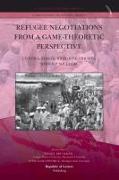Refugee Negotiations from a Game-Theoretic Perspective
BücherAngebote / Angebote:
Refugees are among the poorest people in the world. To date, this group has received relatively little attention in some of the social sciences, especially economics. This book begins to fill the gap by using powerful tools from game theory to better understand the state-level strategic interaction in refugee crises during negotiations for permanent solutions. The three classic solutions to such crises are: repatriation to the country of origin, settlement in the country of first asylum, and resettlement in a third country. Generating such remedies involves assistance from donor countries, and the parties involved often have both common and conflicting interests, giving rise to strategic interactions. As this book shows, game theory is well-suited to such problems. "An innovative application of game theory that provides new and important insights into the refugee problem and raises the bar for future research on the topic. Theoretically rigorous and conceptually rich, Refugee Negotiations from a Game-Theoretic Perspective should be of interest to political scientists with a theoretical bent, qualitative methodologists who develop analytic narratives, and security studies specialists and students of comparative politics who focus on the political consequences of forced migrations." Frank C. Zagare, UB Distinguished Professor of Political Science, University at Buffalo, SUNY "This book will make a valuable contribution to scholarship on refugee issues * an important problem for the world * by showing how formal modeling can contribute to a more sophisticated understanding of both real-world events and policy issues. At the same time, it will stand as an excellent example of game modeling, worthy of emulation by scholars in many fields, including some that are far removed from the specific issues addressed here. The book does a good job of establishing the scope of the problem, not only in terms of numbers and distribution of refugees but also by recounting the legal and institutional context. D. Marc Kilgour, Conflict Analysis, Laurier Centre for Military Strategic and Disarmament Studies, Wilfrid Laurier University, Waterloo, Canada TABLE OF CONTENTS Preface Acknowledgements Ch. 1: Introduction Ch. 2: From Narrative to Model: Cases with Prisoners' Dilemma Payoff Configurations Ch. 3: From Narrative to Model: Cases with Other Payoff Configurations Ch. 4: Theory of Moves Ch. 5: Applying the Theory to the Cases with Prisoners' Payoff Configurations Ch. 6: Applying the Theory to the Cases with Other Payoff Configurations Ch. 7: Lessons and Contributions Appendix References Index ABOUT THE AUTHORS LESTER A. ZEAGER, PhD (1987) Economics, University of Pittsburgh, is Professor of Economics and founding Director of the MA in International Studies program at East Carolina University. His recent publications apply game-theoretic tools to refugee negotiations and explore methods for making income comparisons across groups. RICHARD E. ERICSON, PhD (1979) University of California - Berkeley, is Chair and Professor of the Department of Economics at East Carolina University. Dr. Ericson's primary research areas are comparative economic systems, microeconomic theory, and the economics of transition. JOHN H. P. WILLIAMS, PhD (1988) Political Science, University of North Carolina - Chapel Hill, teaches in the Department of Political Science and the International Studies program at East Carolina University.
Folgt in ca. 5 Arbeitstagen
